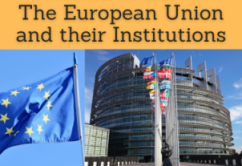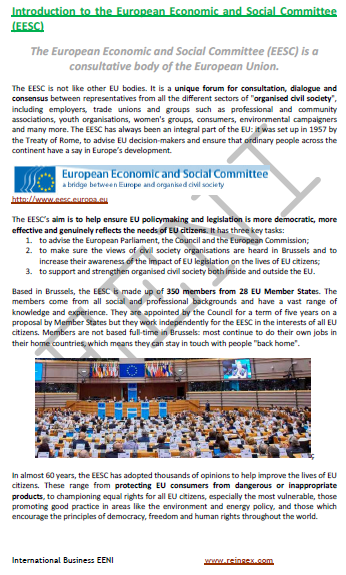European Economic and Social Committee, EU

EU 2020 multi-annual programme (European Economic and Social Committee)
- Introduction to the European Economic and Social Committee (EESC) of the EU
- Functions of the European Economic and Social Committee
- Europe 2020 multi-annual programme
The objectives of the subject “European Economic and Social Committee (EESC)” are the following:
- To understand the role of the European Economic and Social Committee (EESC) as an advisory body to the EU
- To analyze the Europe 2020 Multi-Year Program

The Subject “European Economic and Social Committee” belongs to the following Online Programs taught by EENI Global Business School:
Doctorate: European Business, World Trade.
Masters: International Business, Foreign Trade.

Languages:  or
or  Comité Económico y Social Europeo
Comité Económico y Social Europeo  Comité économique et social européen
Comité économique et social européen  UE.
UE.
Masters adapted for  EU Students.
EU Students.
Sample - European Economic and Social Committee:

The European Economic and Social Committee is a consultative institution of the EU.
The main objective of the EESC (European Economic and Social Committee) is to provide advice to the Institutions of the EU (European Commission, European Council, European Parliament).
The European Economic and Social Committee give opinions based on the proposals from the EU. One of its functions is to serve as a liaison between the Institutions of the EU and the civil society.
The European Economic and Social Committee has links with other economic and social interest groups: Mediterranean countries, ACP countries (Africa, Caribbean, Pacific), Eastern Europe, EU candidates countries, Latin America, v.
The European Economic and Social Committee covers:
- Participation in the enlargement process
- Development of relations with the civil society Organizations in the Western Balkans
- Contribution to the European Neighborhood Policy and relations with Russia
- Relations with the European Free Trade Association economic area countries via a consultative committee
EU Member Countries: Austria, Belgium, Bulgaria, Croatia, Cyprus, Czech Republic, Denmark, France, Estonia, Finland, Germany, Greece, Hungary, Ireland, Italy, Latvia, Lithuania, Luxembourg, Malta, Netherlands, Poland, Portugal, Romania, Slovakia, Slovenia, Spain and Sweden.
(c) EENI Global Business School (1995-2024)
We do not use cookies
Top of this page



